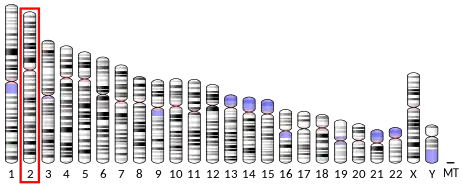UGT1A5
UDP-glucuronosyltransferase 1-5 is an enzyme that in humans is encoded by the UGT1A5 gene.[3][4][5]
| UGT1A5 | |||||||||||||||||||||||||||||||||||||||||||||||||||
|---|---|---|---|---|---|---|---|---|---|---|---|---|---|---|---|---|---|---|---|---|---|---|---|---|---|---|---|---|---|---|---|---|---|---|---|---|---|---|---|---|---|---|---|---|---|---|---|---|---|---|---|
| Identifiers | |||||||||||||||||||||||||||||||||||||||||||||||||||
| Aliases | UGT1A5, UDPGT, UDPGT 1-5, UGT1E, UDP glucuronosyltransferase family 1 member A5 | ||||||||||||||||||||||||||||||||||||||||||||||||||
| External IDs | OMIM: 606430 HomoloGene: 117984 GeneCards: UGT1A5 | ||||||||||||||||||||||||||||||||||||||||||||||||||
| |||||||||||||||||||||||||||||||||||||||||||||||||||
| |||||||||||||||||||||||||||||||||||||||||||||||||||
| |||||||||||||||||||||||||||||||||||||||||||||||||||
| |||||||||||||||||||||||||||||||||||||||||||||||||||
| Wikidata | |||||||||||||||||||||||||||||||||||||||||||||||||||
| |||||||||||||||||||||||||||||||||||||||||||||||||||
Function
This gene encodes a UDP-glucuronosyltransferase, an enzyme of the glucuronidation pathway that transforms small lipophilic molecules, such as steroids, bilirubin, hormones, and drugs, into water-soluble, excretable metabolites. This gene is part of a complex locus that encodes several UDP-glucuronosyltransferases. The locus includes thirteen unique alternate first exons followed by four common exons. Four of the alternate first exons are considered pseudogenes. Each of the remaining nine 5' exons may be spliced to the four common exons, resulting in nine proteins with different N-termini and identical C-termini. Each first exon encodes the substrate binding site, and is regulated by its own promoter.[3]
References
- GRCh38: Ensembl release 89: ENSG00000288705 - Ensembl, May 2017
- "Human PubMed Reference:". National Center for Biotechnology Information, U.S. National Library of Medicine.
- "Entrez Gene: UDP glucuronosyltransferase 1 family".
- Ritter JK, Chen F, Sheen YY, Tran HM, Kimura S, Yeatman MT, Owens IS (February 1992). "A novel complex locus UGT1 encodes human bilirubin, phenol, and other UDP-glucuronosyltransferase isozymes with identical carboxyl termini". J. Biol. Chem. 267 (5): 3257–61. doi:10.1016/S0021-9258(19)50724-4. PMID 1339448.
- Mackenzie PI, Owens IS, Burchell B, Bock KW, Bairoch A, Bélanger A, Fournel-Gigleux S, Green M, Hum DW, Iyanagi T, Lancet D, Louisot P, Magdalou J, Chowdhury JR, Ritter JK, Schachter H, Tephly TR, Tipton KF, Nebert DW (August 1997). "The UDP glycosyltransferase gene superfamily: recommended nomenclature update based on evolutionary divergence". Pharmacogenetics. 7 (4): 255–69. doi:10.1097/00008571-199708000-00001. PMID 9295054.
Further reading
- Yea SS, Lee SS, Kim WY, et al. (2008). "Genetic variations and haplotypes of UDP-glucuronosyltransferase 1A locus in a Korean population". Ther Drug Monit. 30 (1): 23–34. doi:10.1097/FTD.0b013e3181633824. PMID 18223459. S2CID 34396409.
- Sanna S, Busonero F, Maschio A, et al. (2009). "Common variants in the SLCO1B3 locus are associated with bilirubin levels and unconjugated hyperbilirubinemia". Hum. Mol. Genet. 18 (14): 2711–8. doi:10.1093/hmg/ddp203. PMC 2701337. PMID 19419973.
- Zhang T, Haws P, Wu Q (2004). "Multiple Variable First Exons: A Mechanism for Cell- and Tissue-Specific Gene Regulation". Genome Res. 14 (1): 79–89. doi:10.1101/gr.1225204. PMC 314283. PMID 14672974.
- King CD, Rios GR, Green MD, Tephly TR (2000). "UDP-glucuronosyltransferases". Curr. Drug Metab. 1 (2): 143–61. doi:10.2174/1389200003339171. PMID 11465080.
- van Es HH, Bout A, Liu J, et al. (1993). "Assignment of the human UDP glucuronosyltransferase gene (UGT1A1) to chromosome region 2q37". Cytogenet. Cell Genet. 63 (2): 114–6. doi:10.1159/000133513. PMID 8467709.
- Gong QH, Cho JW, Huang T, et al. (2001). "Thirteen UDPglucuronosyltransferase genes are encoded at the human UGT1 gene complex locus". Pharmacogenetics. 11 (4): 357–68. doi:10.1097/00008571-200106000-00011. PMID 11434514.
- Tukey RH, Strassburg CP (2000). "Human UDP-glucuronosyltransferases: metabolism, expression, and disease". Annu. Rev. Pharmacol. Toxicol. 40: 581–616. doi:10.1146/annurev.pharmtox.40.1.581. PMID 10836148.
- Ross CJ, Katzov-Eckert H, Dubé MP, et al. (2009). "Genetic variants in TPMT and COMT are associated with hearing loss in children receiving cisplatin chemotherapy". Nat. Genet. 41 (12): 1345–9. doi:10.1038/ng.478. PMID 19898482. S2CID 21293339.
- Johnson AD, Kavousi M, Smith AV, Chen MH, Dehghan A, Aspelund T, Lin JP, van Duijn CM, Harris TB, Cupples LA, Uitterlinden AG, Launer L, Hofman A, Rivadeneira F, Stricker B, Yang Q, O'Donnell CJ, Gudnason V, Witteman JC (July 2009). "Genome-wide association meta-analysis for total serum bilirubin levels". Hum. Mol. Genet. 18 (14): 2700–10. doi:10.1093/hmg/ddp202. PMC 2701336. PMID 19414484.
This article incorporates text from the United States National Library of Medicine, which is in the public domain.

